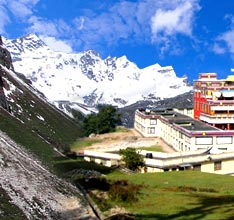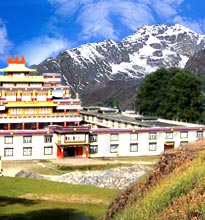Bumchu is another event that forms a part of the
major festivals in Sikkim. The etymology of Bumchu dissects in two
words, where one is Bum meaning 'pot or vase' and the second 'chu' means
'water'. The literal meaning of Bumchu is a "sacred pot".
Bumchu is a Buddhist festival that is celebrated at Tashiding Monastery
in Sikkim, India. Initiated in 1700 AD, Bumchu falls on the 15th day of
first Tibetan calendar year (January-February).
The highlight of this festival is marked by a sacred pot that contains
holy water. It is believed that the water level in the pot forecasts the
events of the impending year. In case, water is found till the brim, the
idea of bloodshed and turbulence is indicated. If the pot is
approximately dehydrated, it is an indication of severe famine in
Sikkim. A half-filled pot is considered as the sign of peace and
prosperity.
During the festival, a fraction of the holy water is distributed
amongst the devotees. In the midst of chants and prayers, the sacred pot
is again refilled with water and sealed to conclude the festival. This
sacred pot is opened after one year, in the next Bumchu festival. The
Bumchu is an important festival that is linked with traditions and
sentiments of the Sikkimese'. The celebration of the festival attracts
devotees from all parts of Sikkim.








